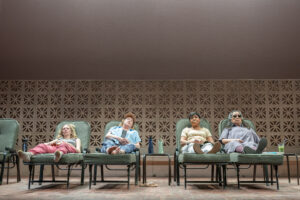Annie Baker’s outstanding play about women coping with pain
★★★★

Infinite Life by Annie Baker, which I saw at the National Theatre’s Dorfman, is a play you might find riveting or soporific, or both. Five women all have illnesses that are causing them chronic pain but that conventional medicine has been unable to treat. Desperate for a cure, they have resorted to fasting in a retreat in California.
They lie on sun loungers, they doze, they sip their water or green drinks… and they talk. There’s no action, no emotional explosions, no-one dies, and no dramatic plot twists, although there is an interesting development at the end.
It sounds like a snooze-fest, and in fact some members of the audience did doze or even leave, but I was engrossed by this outstanding play.
Infinite Life may remind you of Waiting For Godot and its days apparently repeating into infinity. Like Beckett’s play, there is not much drama but a lot going on beneath the surface and quite a bit of humour. For good measure, there is the doctor in charge of the clinic, and possibly their fates, who is mentioned frequently but never appears.
Why is it called ‘Infinite Life’? I think, because the five women are so consumed by their pain that they live very much in the moment, unable to think of life beyond it.
I understand that you may prefer loud over quiet, fast over slow, witty comedy over gentle humour, but personally I loved the way every sentence of Annie Baker’s dialogue seems carefully constructed to work on two levels, and rewarded concentrated listening.
There’s the surface of apparently inconsequential talk about what they’re reading, their lists of diagnoses and failed treatments, their chat about sex. Then there are the implications of what they’re saying in the context of the pain they are feeling, as well as the hints of the lives they have led and will lead outside of this moment of suspended time.
Even Annie Baker’s trademark pauses and silences as the women gather their thoughts, or get lost in them, reinforce the disorientation caused by fasting. They also provide us the audience with moments of contemplation.
If you’re expecting their pain to be a metaphor for life, you’ll be disappointed. It is what it says on the tin. As one of the characters says: ‘If pain doesn’t mean anything, it’s so boring. But if it means anything at all then I don’t know if I can bear it.’ It is what it brings out in their characters that stands out.
It is certainly not as depressing as you might imagine. Most of the time, rather than feel sorry for them, you admire these women’s resilience, and the mutual respect inspired by their confinement together and common predicament. Their conversations are leavened with some very funny lines. I could have carried on listening to their conversations long beyond the one hour 45 minutes.
This is a joint National Theatre and Atlantic Theater Company production but the effort has been put in by the Americans. Thanks to an agreement between the British actors’ union and American Equity, the off-Broadway production has been transported set, creatives and cast. And what a cast we were privileged to see! Annie Baker has created five strong characters. Directed by James Macdonald, all the actors do a superlative job at subtly suggesting their suffering, their vulnerability, their fortitude and their inner life.
The women are mostly in their sixties or seventies. Marylouise Burke as Eileen, the oldest, shuffles slowly on and off stage, carefully laying out her cushions on her lounger, moving with delicate precision as if every movement hurts.
Mia Katigbak plays Yvette, precise and firm in her thoughts, and who reels off a tremendously long list of ailments, but also reveals her desperation for the fasting to be a cure. Brenda Pressley is Elaine, reserved and determined. As Ginnie, Kristine Nielsen has a twinkling eye and a playful manner.
Christina Kirk plays Sofi, at 47 the youngest of the cohort. She is tortured, and self torturing, at times blaming herself for her illness. You might think that chronic pain would push sex off the agenda. Far from it. While the older women muse on sex, she is still wracked by desire: forbidden lust that has jeopardised her marriage, the sex itself that is debilitatingly painful, the desperate belief that orgasms might be the cure. In the night, she leaves voice messages about her agony for her husband, and sexual fantasies for her platonic lover.
Incidentally, this was the second National Theatre production running I’ve seen (The House Of Bernarda Alba being the first), in which a woman has masturbated on stage. I’m hoping this isn’t now mandatory because the next show I’m seeing at the National is a family show, The Witches.
Sex crops up quite frequently as a subject for conversation. Someone wonders if bad sex is the cause of illness. On another occasion, there is an extended discussion after someone reveals that a cousin describes pornography for blind people. We always learn about their characters from what they say.
Some time into the play, a solitary man appears. Nelson is mature and attractive enough to make the women take notice. His character is much more thinly drawn than those of the women but Pete Simpson exhibits a believable arrogance. Unlike the others, he has a specifically identified and, it would seem, mortal disease. He seems to be introduced for two reasons. I’ll come to the other later but the first is to provide a contrast to the women’s camaraderie. ‘I don’t want to sound like a dick,’ he says, then proceeds to do just that.
He is the only character who contends that his agony is worse than that of the others. Sofi says to him: ‘You don’t actually know if your level of pain that night was worse than my level of pain on my worst night. It’s impossible to know.’ Until then, I hadn’t fully taken on board how, for the women, their suffering is not a competition. They realise that, like sex, everyone has their own unique, incomparable experience of suffering. And as an audience, we cannot make a judgment. They and we can only offer a gentle sympathy.
Privately it may be different. Eileen, who seems the calmest of all, has a moment alone on stage when she says: ‘This is the night you heard me screaming. I said terrible things …I said none of you have ever been in this much pain …I said it’s a conspiracy..I said …A minute of this is an infinity.’ Not something any of them would actually say out loud to one another: they keep their all-engulfing agony to themselves.
When they’re not talking about sex or illness, the women often talk philosophically about what they have read, and again we can see how what interests them reflects on their own lives- how did a similarly ill woman go about setting up a successful business; does an Asian pirate, brought up in a certain culture (for which, perhaps, read afflicted by sickness), have the free will to choose his actions or is he bound to act in a certain way?
Boring or entertaining or both?
Most significantly, Sofi is trying to read George Eliot’s novel Daniel Deronda. This is not a random choice by Annie Baker. When asked what it’s about, Sofi says that so far the book is concerned with Gwendoline and her suitors. Those familiar with the novel will know that Gwendoline is self-obsessed, contained in her own world, much as people in constant agony are.
She says: ‘If I’m not reading it all the time it seems really boring, but once I’m into it, it’s like the most entertaining thing in the world.’ Is Annie Baker giving a knowing wink to the audience about this play?
Sofi is finding it hard to get beyond page 152. The sentence she gets stuck at says irrational fear can stop you doing what you know is achievable. Something else to think about, and certainly relevant to the test Nelson provides for Sofi on whether she will act on her sexual desire.
Dusk follows day, night takes over, then another day in the blazing Californian sun begins. Lighting designer Isabella Byrd dims the lights into moonlight that actually feels cool, then slams on a sudden migraine-inducing flood of daylight. The women’s current lives may be an infinite loop as each day merges into the next but there is a finite time frame to the play. It begins with the first day of Sofi’s stay at the retreat and ends on the day she leaves.

The set, from the New York design collective, dots, suggests the monotony of fasting. It is minimal and never changing. In front of a beige background, there’s a patterned breeze block wall of a similar colour, about two metres tall. In front of that there are a number of loungers. The cheap nature of the wall and beds implies that the so-called clinic is a new age sham designed to make money from desperate people who have been failed by medical science.
For the majority of the play, the women lie down as if their loungers are islands in an ocean of agony. They talk but they don’t make physical contact or delve deeply into each other’s lives. Then, as we reach the final minutes of the play, there is a moment between Sofi and Eileen, which does seem to take us forward.
They touch each other, both mentally and physically. It’s a human connection that suggests we need not be alone in our pain. This seems to point to a way in which we can possibly learn from it. Perhaps by moving from the inward-facing world of Gwendoline to the outward-looking and more empathetic behaviour of Daniel Deronda himself.
Annie Baker is that rare class of writer who can create a funny, moving play about the human condition, without resorting to easy messages and emotional manipulation.
Infinite Life was performed at the Linda Gross Theater in New York from August 18 to October 15, 2023, and from 22 November 2023 to 13 January 2024 at the National Theatre’s Dorfman Theatre.
Paul purchased his ticket.
Click here to watch the video of this review on the YouTube channel Theatre Reviews With Paul Seven

